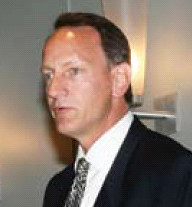Dean O’s “Hot Tango” Speech
Dean Olmstead, director of Loral Space and Communications, said the satellite industry is in the midst of a “hot tango” with the financial community but warned that the industry needs to make sure that the tango does “not turn into a rave.” The financial community is enthusiastic to invest in the satellite industry, especially new opportunities being driven by huge demand for content on the move, Olmstead said Monday
at SATELLITE 2007. But with history littered with spectacular failures, the industry needed to proceed with caution when approaching these new opportunities and not charge headlong into these new market segments “like five-year old kids chasing a soccer ball.”Olmstead pinpointed numerous opportunities for the satellite industry in areas such as Digital Multimedia Broadcasting and Digital Audio Radio Satellite, but while the broad tone of his speech was optimistic, there was an undercurrent of caution behind his statements. “The financial markets have a lot of money that they are offering,” he said. “You could say there is almost too much money. There are lots of opportunities for new business and to take risks.”
Throughout his speech, Olmstead would paint a bright picture but then invariably put in the odd dark cloud of warning. He also stressed the importance of “satellite fundamentals,” a more old-school type term amongst the new market opportunities. Olmstead pointed to the strengths of the satellite such as point-to-multipoint broadcasting. He pointed to the success of SES Astra and the strong position they have in the market, as well as the Intelsat/Panamsat merger and the importance of point-to-multipoint distribution in the context of that deal.
The other key fundamental Olmstead pointed to was something he dubbed “white spaces” where satellite could provide coverage beyond terrestrial alternatives. However, the demand from the new generation of users for mobile communication services is such that services like Digital Multimedia Broadcasting are no longer dependent on having these so-called “white spaces” to succeed. Olmstead spoke of the multi-faceted nature of modern communications and how the younger generation was anxious to consume video and have a more “liquid” form of communications. With these stronger consumption patterns in mind, Olmstead believes there has never been a better time for the satellite industry to have a stronger impact in the modern communications world.
Olmstead believed satellite operators need to take a more outward approach in its thinking. He referred to Terrestar, a company that likes to see itself as a network company and not a satellite company, and also noted the trend of different people running satellite operators, pointing out David McGlade at Intelsat and Andy Sukawaty at Inmarsat, two executives with strong telecoms backgrounds.
Another key theme of Olmstead’s speech related to the Asia Pacific market. He spoke in-depth about AsiaSat, as well as the impact China could have on the global communications market. According to Olmstead, the SES deal with GE was a “win-win” situation and “is excellent for the Asian marketplace.” Olmstead also hinted at a more vibrant communications landscape in Asia, noting that governments in the region “were acting in a more pragmatic way than before.”
However, Olmstead again followed with a warning. He talked of the growing influence of China and the financial firepower it now carries, warning if Congress adopted a more aggressive stance towards China, it could create long-term ramifications for the satellite industry. In a direct warning to U.S. politicians, Olmstead said, “As an industry, that would not be a cool thing (if Congress flexed its muscles) to happen if they were to buy fewer U.S. treasuries, the kind of low-cost debt money fuelling acquisitions would begin to change. I think you would see fewer [private equity] owners, and more strategic owners.”

